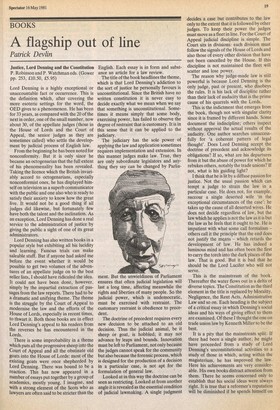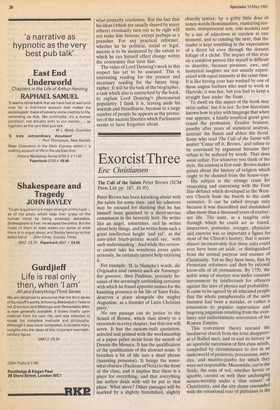BOOKS
A flagship out of line
Patrick Devlin
Justice, Lord Denning and the Constitution P. Robinson and P. Watchman eds. (Gower pp. 253, £10.50, £5.95) Lord Denning is a highly exceptional or unaccountable fact or occurrence. This is the definition which, after covering the more esoteric settings for the word, the OED gives to a phenomenon. He has been for 33 years, as compared with the 20 of the next in order, one of the small number, now about 30, of the appellate judges (those in the House of Lords and the Court of Appeal, the senior judges as they are sometimes called) who settle the development by judicial process of English law.
From the beginning he has been noted for nonconformity. But it is only since he became an octogenarian that the full extent of his phenomenality has been revealed. Taking the licence which the British invariably accord to octogenarians, especially nonconformist ones, he has displayed himself on television as a superb communicator with the public and one also who is ready to satisfy their anxiety to know how the great live. It would not be a good thing if all judges did likewise, but fortunately few have both the talent and the inclination. As an exception, Lord Denning has done a real service to the administration of justice by giving the public a sight of one of its great administrators.
Lord Denning has also written books in a popular style but exhibiting all his lucidity and learning. Famous trials can make saleable stuff. But if anyone had asked me before the event whether it would be possible to get two volumes of the adventures of an appellate judge on to the best seller lists, I should have ridiculed the idea. It could not have been done, however, simply by the impartial extraction of passages from the law reports. There had to be a dramatic and unifying theme. The theme is the struggle by the Court of Appeal to modernise the law and the efforts of the House of Lords, especially in recent times, to thwart it. Both those books are in effect Lord Denning's appeal to his readers from the reverses he has encountered in the Lords.
There is some improbability in a theme which puts all the progressive sheep into the Court of Appeal and all the obstinate old goats into the House of Lords: most of the existing goats were once shepherded by Lord Denning. There was bound to be a reaction. This has now appeared in a number of essays put together by a group of academics, mostly young, 1 imagine, and with a strong element of the Scots who as lawyers are often said to be stricter than the English. Each essay is in form and substance an article for a law review.
The title of the book headlines the theme, which is that Lord Denning's addiction to the sort of justice he personally favours is unconstitutional. Since the British have no written constitution it is never easy to decide exactly what we mean when we say that something is unconstitutional. Sometimes it means simply that some body, exercising power, has failed to observe the degree of restraint that is customary. It is in this sense that it can be applied to the judiciary.
The judiciary has the sole power of applying the law and application sometimes requires implementation and extension. In this manner judges make law. True, they are only subordinate legislators and anything they say can be changed by Parlia ment. But the unwieldiness of Parliament ensures that often judicial legislation will last a long time, affecting meanwhile the rights and liberties of many people. So the judicial power, which is undemocratic, must be exercised with restraint. The customary restraint is obedience to precedent.
The doctrine of precedent requires every new decision to be attached to an old decision. Thus the judicial animal, be it sheep or goat, is hobbled; it may not advance by leaps and bounds. Innovation must be left to Parliament, not only because the judges cannot speak for the community but also because the forensic process, which is designed for the production of a decision in a particular case, is not apt for the formulation of general law. Looked at in this way the doctrine can be seen as restricting. Looked at from another angle it is revealed as the essential condition of judicial lawmaking. A single judgment decides a case but contributes to the law only to the extent that it is followed by other judges. To keep their power the judges must move as a fleet in line. For the Court of Appeal judicial discipline is simple. The Court sits in divisions: each division must follow the signals of the House of Lords and also those of every other division that have not been cancelled by the House. If this discipline is not maintained the fleet will scatter and lose power.
The reason why judge-made law is still powerful is because Lord Denning is the only judge, past or present, who disobeys the rules. It is his lack of discipline rather than their lack of audacity that is the prime cause of his quarrels with the Lords.
This is the indictment that emerges from the book, though not with singular clarity since it is framed by different hands. Some document the indiscipline; others inspect without approval the actual results of the audacity. One author searches unsuccessfully for 'a coherent pattern of legal thought'. Does Lord Denning accept the doctrine of precedent and acknowledge its obligations? If so, what are his departures from it but the abuse of power for which he rebukes others, notably the trade unions? If not, what is his guiding light?
I think that he is lit by a diffuse passion for justice. Not the usual passion which can tempt a judge to strain the law in a particular case. He does not, for example, succour a single deserted wife 'in the exceptional circumstances of the case': he takes up the cause of all deserted wives. He does not decide regardless of law, but the law which he applies is not the law as it is but the law as he feels that it ought to be. He is impatient with what some call formalism — others call it the principle that the end does not justify the mans — which retards the development of law. He has indeed a luminous mind and has often been the first to carry the torch into the dark places of the law. That is good. But it is bad that he should be the Lord Lucifer who will not serve.
This is the mainstream •of the book. Thereafter the water flows out in a delta of • diverse topics. The Constitution as the third element in the title is replaced by Morality, Negligence, the Rent Acts, Administrative Law and so on. Each heading is the subject of a critical essay in which Denning's social ideas and his ways of giving effect to them are examined. Of these I thought the one on trade union law by Kenneth Miller to be the best.
It is a pity that the mainstream split. If there had been a single author, he might have proceeded from a study of Lord Denning's unconstitutional activities to a study of those in which, acting within the magisterium, he has improved the law. Here his achievements are very considerable. His own books distract attention from them. There he seems concerned only to establish that his social ideas were always right. It is true that a reformer's reputation will be diminished if he spends himself on what posterity condemns. But the fact that his ideas (which are usually shared by many others) eventually turn out to be right will not make him famous, except perhaps as a preacher. For any practical reformer, whether he be political, social or legal, success is to be measured by the extent to which he can himself effect change within the constraints that limit him.
The value of Lord Denning's work in this respect has yet to be assessed. This is interesting reading for the present and necessary reading for the future biographer. It will be the task of the biographer, a task which also is untouched by the book, to explain Lord Denning's phenomenal popularity. I think it is, leaving aside his warmth and friendliness, because to a large number of people he appears as the protector of the ancient liberties which Parliament seems to have forgotten about.











































 Previous page
Previous page